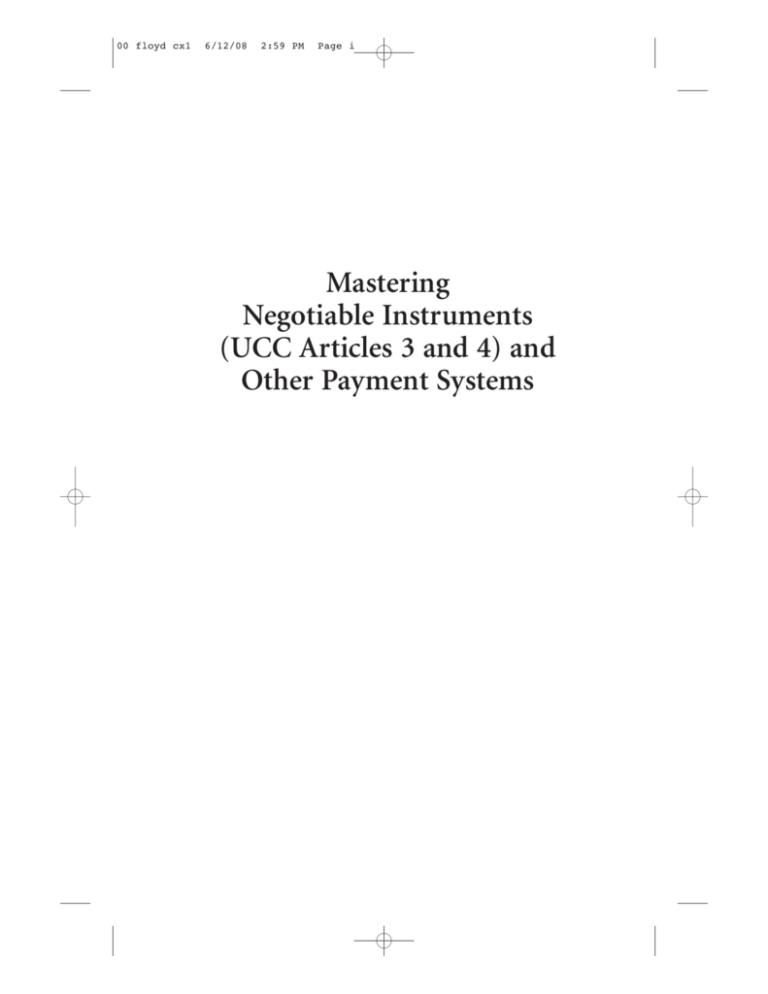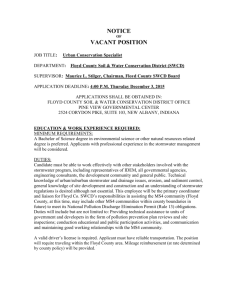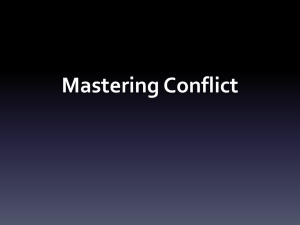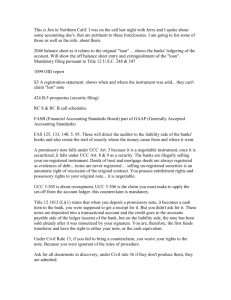
00 floyd cx1
6/12/08
2:59 PM
Page i
Mastering
Negotiable Instruments
(UCC Articles 3 and 4) and
Other Payment Systems
00 floyd final
7/11/08
8:36 AM
Page ii
Carolina Academic Press Mastering Series
Russell Weaver, Series Editor
Mastering Bankruptcy
George W. Kuney
Mastering Civil Procedure
David Charles Hricik
Mastering Criminal Law
Ellen S. Podgor, Peter J. Henning, Neil P. Cohen
Mastering Evidence
Ronald W. Eades
Mastering Intellectual Property
George W. Kuney
Mastering Legal Analysis and Communication
David T. Ritchie
Mastering Negotiable Instruments (UCC Articles 3 and 4)
and Other Payment Systems
Michael D. Floyd
Mastering Products Liability
Ronald W. Eades
Mastering Statutory Interpretation
Linda D. Jellum
00 floyd final
7/11/08
8:36 AM
Page iii
Mastering
Negotiable Instruments
(UCC Articles 3 and 4) and
Other Payment Systems
Michael D. Floyd
Samford University, Cumberland School of Law
Carolina Academic Press
Durham, North Carolina
00 floyd final
7/11/08
8:36 AM
Page iv
Copyright © 2008
Michael D. Floyd
All Rights Reserved.
Library of Congress Cataloging in Publication Data
Floyd, Michael D.
Mastering negotiable instruments (UCC Articles 3 and 4) and other payment systems / by Michael D. Floyd.
p. cm. -- (Carolina Academic Press mastering series)
Includes bibliographical references and index.
ISBN 978-1-59460-366-2 (alk. paper)
1. Negotiable instruments--United States. 2. Payment--United States. I.
Title. II. Series.
KF957.F56 2008
346.73'096--dc22
2008025889
Carolina Academic Press
700 Kent Street
Durham, NC 27701
Telephone (919) 489-7486
Fax (919) 493-5668
www.cap-press.com
Printed in the United States of America
00 floyd final
7/11/08
8:36 AM
Page v
For my students, who teach me so much
00 floyd final
7/11/08
8:36 AM
Page vi
00 floyd final
7/11/08
8:36 AM
Page vii
Contents
Series Editor’s Foreword
xvii
Acknowledgments
xix
Chapter 1 · Introduction
Roadmap
Checkpoints
3
3
5
Chapter 2 · The Law Governing Payment Systems: Uniform Law,
Other State Law, Federal Law, Private Ordering
Arrangements, and International Law
Roadmap
A. The Uniform Commercial Code (UCC) and Other State Law
B. Federal Statutes and Regulations
C. Judicial Decisions
D. Private Ordering Arrangements
E. International Law
F. Mastering the Statutes
G. A Note on Citations
Checkpoints
7
7
8
9
11
11
12
13
13
14
Part One
Negotiable Instruments
(UCC Article 3)
Chapter 3 · Drafts and Notes
Roadmap
A. Drafts and Notes as Types of Payment Systems
B. Note Terminology and Functions
C. Draft Terminology and Functions
Checkpoints
vii
17
17
17
19
20
22
00 floyd final
viii
7/11/08
8:36 AM
Page viii
CONTENTS
Chapter 4 · Specialized Negotiable Instruments
Roadmap
A. Cashier’s Checks
B. Teller’s Checks
C. Certified Checks
D. Traveler’s Checks
E. Certificates of Deposit
F. Article 9 Instruments
G. “Acceptance,” “Accepted,” “Accept,” etc. in Article 3
1. The Confusing UCC Definition of “Acceptance”
2. Appropriate Use of “Acceptance”:
Certified Checks and Bankers’ Acceptances
Checkpoints
23
23
23
24
24
25
26
27
28
28
Chapter 5 · Characteristics of All Negotiable Instruments
Roadmap
A. Unconditional
B. Promise or Order
C. Fixed Amount of Money
D. Payable to Bearer or to Order
E. Payable on Demand or at a Definite Time
F. Free of Any Non-Monetary Undertaking or Instruction
G. No Opt-Out from UCC Article 3
Checkpoints
31
31
33
34
34
36
37
38
38
39
Chapter 6 · Issue, Transfer, and Negotiation of Negotiable Instruments
Roadmap
A. Issue
B. Transfer and Negotiation
C. Holders
D. Persons Entitled to Enforce
E. Indorsements
1. Blank Indorsements
2. Special Indorsements
3. Restrictive Indorsements
4. Anomalous Indorsements
F. Loss and Theft
Checkpoints
41
41
41
42
43
43
44
44
45
45
45
46
46
29
30
00 floyd final
7/11/08
8:36 AM
Page ix
CONTENTS
Chapter 7 · Holders, the Holder-In-Due-Course Doctrine,
and the Shelter Rule
Roadmap
A. Benefits of Being a Holder
B. Requirements to Become a Holder
1. Possession
2. Payable to Bearer or to the Person in Possession
a. Instruments Payable to Bearer
b. Instruments Payable to Order (i.e., to an Identified Person)
c. Effect of Indorsements
C. Benefits of Being a Holder in Due Course
1. Defenses
a. Real Defenses
b. Personal Defenses
c. Payment and Other Means of Discharge
2. Claims in Recoupment
3. Claims to a Negotiable Instrument
4. Other Special Rules Relating to Defenses, Claims,
and Holders in Due Course
D. Requirements to Become a Holder in Due Course
1. Value
2. Good Faith
3. No Notice of Problems with the Instrument
a. Overdue, Dishonored, or Affected by Uncured Defaults
b. Unauthorized Signatures or Alterations
c. Claims to the Instrument
d. Defenses and Claims in Recoupment
E. Exercising Someone Else’s Rights as Holder
or Holder in Due Course: The Shelter Rule
Checkpoints
Chapter 8 · Basic Liability Rules for Negotiable Instruments
Roadmap
A. Signatures on Negotiable Instruments
1. Signatures by Agents
2. Forged Signatures
3. Other Signature Rules
B. Types of Liability: Issuer (Maker or Drawer), Indorser,
or Acceptor
ix
47
47
48
49
49
49
49
50
50
51
51
52
53
53
54
54
55
56
57
58
59
59
61
62
62
62
64
65
65
66
66
68
68
68
00 floyd final
x
7/11/08
8:36 AM
Page x
CONTENTS
1. Issuers (Makers and Drawers) in General
2. Issuers of Notes and Cashier’s Checks
3. Drawers of Drafts
4. Indorsers
5. Acceptors
C. Liability for Altered Instruments
1. Incomplete Instruments
2. Completed Instruments
Checkpoints
Chapter 9 · Payment and Other Means of Discharge
Roadmap
A. Who May Make Payment
B. Who Must Receive Payment
1. Payment “to a Person Entitled to Enforce”
2. Conflicting Claims to the Instrument
C. Other Discharge Mechanisms
1. Cancellation, Renunciation, etc.
2. Drawers of Drafts
3. Indorsers
4. Other Discharge Rules for Secondary Obligors
Checkpoints
Chapter 10 · Secondary Obligors: Guarantors, Sureties,
Accommodation Parties, and Other Secondary Sources
of Repayment
Roadmap
A. Distinguishing Primary and Secondary Sources of Repayment
B. Terminology
C. Secondary Obligations on the Instrument Itself
1. Classifications of Signatures on the Instrument
a. Joint and Several Liability
b. Principal and Secondary Liability
2. Sorting Out the Ultimate Cost of the Debt
a. Contribution
b. Reimbursement
c. No Recovery by Principal Obligors against
Secondary Obligors
3. Suretyship Defenses
a. Impairment of Collateral
69
69
70
71
71
72
72
73
74
75
75
76
76
76
77
78
78
78
79
80
80
81
81
81
84
85
85
86
86
87
87
88
89
89
90
00 floyd final
7/11/08
8:36 AM
Page xi
CONTENTS
b. “Other” Modifications
c. Extension of Time
d. Release
e. Other Limits on Release, Modification, etc.
D. Secondary Obligations in a Separate Guaranty Agreement
1. The Nature of the Transaction
2. Waivers
3. Governing Law
E. Letters of Credit
1. Governing Law
2. Basic Terminology and Mechanics
3. Documentary Letters of Credit
4. Standby Letters of Credit
Checkpoints
Appendix: Section 3-605 Subsection Comparison
Chapter 11 · Underlying Obligations: Suspension and Discharge
Roadmap
A. The Simple Case with Specialized Instruments: Certified Checks,
Cashier’s Checks, and Teller’s Checks
B. The Usual Case: Notes and Non-Specialized Checks
C. Payment
D. Presentment, Dishonor, Notice of Dishonor
1. Presentment
2. Dishonor
3. Notice of Dishonor
Checkpoints
xi
91
92
93
93
94
94
94
95
95
96
96
97
98
99
100
103
103
104
105
106
106
107
107
107
108
Part Two
Check Collection (UCC Article 4 and Related Federal Law)
Chapter 12 · Forward Collection, Presentment, and Final Payment
Roadmap
A. Parties and Terminology
B. Applicable Law: The Complex Intersection of State
and Federal Rules
C. The Normal Path of a Check
D. Presentment
E. Settlement and Payment
1. Provisional Settlement
111
111
112
112
113
114
114
115
00 floyd final
xii
7/11/08
8:36 AM
Page xii
CONTENTS
2. Final Payment
a. The Midnight Deadline Rule
b. Other Ways the Payor Bank Might Make Final Payment
c. Basic Definitions
d. Extension of Time for Afternoon Receipt
e. Examples
3. Consequences of Making Final Payment
a. Consequences to the Payor Bank
b. Consequences to Collecting Banks
F. Is the Check “Properly Payable”?
1. The Meaning of “Properly Payable”
2. Overdrafts
3. Forgeries
4. Stop Payment Orders
5. Postdated Checks
Checkpoints
115
115
116
117
117
118
119
119
119
120
120
120
121
121
122
123
Chapter 13 · Funds Availability to Depositors
Roadmap
A. UCC Rules
B. Expedited Funds Availability Act/Regulation CC Rules
1. Subpart A of Reg. CC: Definitions
2. Subpart B of Reg. CC: Availability Rules
a. The General Availability Schedule
b. Adjustments for Risk Factors
3. Bank Liability for Noncompliance
Checkpoints
125
125
125
126
127
128
129
129
131
131
Chapter 14 · Dishonor, Return Mechanisms, Deadlines,
and Bank Liability
Roadmap
A. UCC Rules
1. Dishonor
2. Wrongful Dishonor
3. UCC Return Mechanism
4. Payor Bank Return Deadlines and Liability
5. Collecting Bank Return Deadlines and Liability
B. EFAA/Reg. CC Rules
1. Overview of Subpart C Expedited Collection and Return Rules
133
133
134
134
135
136
136
137
138
138
00 floyd final
7/11/08
8:36 AM
Page xiii
CONTENTS
2. Expeditious Return
a. Two-Day/Four-Day Test
b. Forward Collection Test
3. Notice of Nonpayment of $2,500.00+ Checks
4. Special Rule Extending the UCC Deadlines
5. Reg. CC Liability
C. Check 21
1. Overview
2. Definitions
3. Substitute Checks
4. Warranties and Indemnity
5. Expedited Recredit
a. Consumer Claims for Recredit
b. Bank Claims for Recredit
Checkpoints
Chapter 15 · Fundamental Loss Allocation under the UCC
Roadmap
A. Drawer and Indorser Liability
B. Transfer and Presentment Warranties
1. Comparing the Article 3 and Article 4
Versions of the Warranties
2. Differences between the Transfer Warranties
and the Presentment Warranties
a. Who Gets Which Warranties
b. Effect of a Forged Drawer’s Signature
c. No Defense, Claim in Recoupment, or
Insolvency Proceeding
3. Warranties Given for Both Transfer and Presentment
a. Person Entitled to Enforce
b. No Alteration
c. Special Warranty for Remotely Created Consumer Items
4. General Effects of a Breach of Warranty
C. Examples
1. Forged Drawer’s Signature
2. Forged Indorsement
3. Alteration
Checkpoints
xiii
139
139
140
140
141
141
142
142
143
143
144
145
145
145
146
147
147
148
149
149
149
149
150
151
151
151
152
153
154
155
155
157
159
161
00 floyd final
xiv
7/14/08
9:38 AM
Page xiv
CONTENTS
Chapter 16 · Specialized UCC Loss Allocation Rules
for Negotiable Instruments
163
Roadmap
163
A. Section 3-407: Alterations
165
B. Section 3-406: General Negligence
166
C. Section 4-406: Failure to Examine Bank Statements
167
D. Section 3-405: Fraudulent Indorsements by Employees
169
1. Checks Payable to the Employer
169
a. Cashing the Check
169
b. Depositing the Check in the Dishonest Employee’s Account 170
c. Comparative Negligence
171
2. Checks Issued by the Employer
171
E. Section 3-404: Impostors and Fictitious Payees
172
F. Conversion
172
Checkpoints
174
Part Three
Other Payment Systems
Chapter 17 · The Law of Credit Cards
Roadmap
A. Overview
B. Issuance Restrictions
C. Disclosure of Credit Card Terms
1. Initial Disclosure Requirements
2. Periodic Statement Disclosures
3. Other Disclosure Requirements
D. Cardholder Rights for Addressing Problems with Transactions
1. Unauthorized Use
2. Assertion of Claims and Defenses
3. Billing Errors
E. Other Cardholder Protections
Checkpoints
177
177
177
178
179
180
181
181
181
182
183
184
185
185
Chapter 18 · The Law of Debit Cards
Roadmap
A. Overview
B. Issuance
C. Disclosure
1. Initial Disclosure
2. Post-Issuance Disclosure
187
187
187
189
189
190
190
00 floyd final
7/14/08
9:38 AM
Page xv
CONTENTS
D. Limits on Liability
E. Error Resolution
Checkpoints
xv
190
191
192
Chapter 19 · Funds Transfers (UCC Article 4A)
Roadmap
A. Overview
1. United States Law
2. International Law
B. Terminology and Parties
1. Funds Transfer
2. Payment Order
3. Beneficiary and Beneficiary’s Bank
4. Originator and Originator’s Bank
5. Sender and Receiving Bank
6. Intermediary Bank
7. Payment Date and Payment
C. Acceptance or Rejection of Payment Orders
1. Acceptance
2. Rejection
3. Other Liability Rules
Checkpoints
193
193
193
193
195
195
195
196
196
196
197
197
197
197
197
198
198
199
Epilogue
201
Master Checklist
203
Index
207
00 floyd cx1
6/12/08
2:59 PM
Page xvi
00 floyd cx1
6/12/08
2:59 PM
Page xvii
Series Editor’s Foreword
The Carolina Academic Press Mastering Series is designed to provide you
with a tool that will enable you to easily and efficiently “master” the substance
and content of law school courses. Throughout the series, the focus is on quality writing that makes legal concepts understandable. As a result, the series is
designed to be easy to read and is not unduly cluttered with footnotes or cites
to secondary sources.
In order to facilitate student mastery of topics, the Mastering Series includes
a number of pedagogical features designed to improve learning and retention.
At the beginning of each chapter, you will find a “Roadmap” that tells you
about the chapter and provides you with a sense of the material that you will
cover. A “Checkpoint” at the end of each chapter encourages you to stop and
review the key concepts, reiterating what you have learned. Throughout the
book, key terms are explained and emphasized. Finally, a “Master Checklist”
at the end of each book reinforces what you have learned and helps you identify any areas that need review or further study.
We hope that you will enjoy studying with, and learning from, the Mastering Series.
Russell L. Weaver
Professor of Law & Distinguished University Scholar
University of Louisville, Louis D. Brandeis School of Law
xvii
00 floyd cx1
6/12/08
2:59 PM
Page xviii
00 floyd cx1
6/12/08
2:59 PM
Page xix
Acknowledgments
I am grateful to the Cumberland School of Law and Samford University for
enabling me to teach and explore the topic of this book and other subjects that
interest me. I particularly appreciate Dean John Carroll, Associate Dean Corky
Strickland, Vice Dean Jim Lewis, and Director of Faculty Development Brannon Denning for the many ways that they support my efforts. My years toiling in the commercial law vineyard have been educational and enjoyable
thanks in large part to Samford colleagues Howard Walthall and Paul Kuruk,
former Samford colleagues Larry Ahern, Steve Ware, and Tim Zinnecker, University of Alabama colleagues Bill Henning and Gene Marsh, University of
Tennessee colleagues George Kuney, Bob Lloyd, and Tom Plank, and many
others. I have gained much knowledge and many good friends from participating in the Alabama Law Institute’s law reform efforts; in that work I learned
much that is relevant to this book from Douglas Arendall, Hamp Boles,
Richard Carmody, David Carroll, Rob Couch, Penny Davis, Ed Dean, Bill
Hairston, III, Palmer Hamilton, Wallace Malone III, Bob McCurley, Ron
Sims, Hon. James Sledge, Joe Stewart, Stephen Trimmier, Sam Upchurch, and
Larry Vinson. I am fortunate to have had outstanding student research assistants: most recently Anna Smith, Carolyn Lam, and Heather Sharp. Special
thanks are due to Janice Brantley, my Assistant who handles innumerable details, arrangements, and problems with consistent skill, dedication, grace, and
good humor. Thanks also to Russ Weaver and the editors at Carolina Academic Press, who have been exceptionally accommodating in this project.
I acknowledge my indebtedness to authors whose books I regularly turn to
for insight and guidance: James J. White & Robert S. Summers, Uniform
Commercial Code (5th ed. 2000); Fred H. Miller & Alvin C. Harrell, The Law
of Modern Payment Systems (2003 & Supp. 2006); Frederick M. Hart and
William F. Willier, Negotiable Instruments Under the Uniform Commercial
Code (2007). Similarly, I have great admiration and appreciation for the authors of books I have used to teach this material: Ronald J. Mann, Payment
Systems and Other Financial Transactions: Cases, Materials, and Problems
(3rd ed 2006) (and previous editions); Robert L. Jordan, & William D. Warren, Commercial Law (3rd ed. 1992); and David C. Epstein, James A. Marxix
00 floyd final
xx
7/3/08
9:51 AM
Page xx
ACKNOWLEDGMENTS
tin, William H. Henning, & Steve H. Nickles, Basic Uniform Commercial
Code: Teaching Materials (3rd ed. 1988).
Of course, if anything in this book is wrong, misguided, trivial, or boring,
that responsibility is entirely my own.
Last, but most important, I note my gratitude, love, affection, and appreciation for Annette and our children — John, Sarah, Ellen, and Russell — who
bring tremendous joy and meaning to my world.
Michael D. Floyd
Samford University,
Cumberland School of Law
Birmingham, Alabama
June 2008









